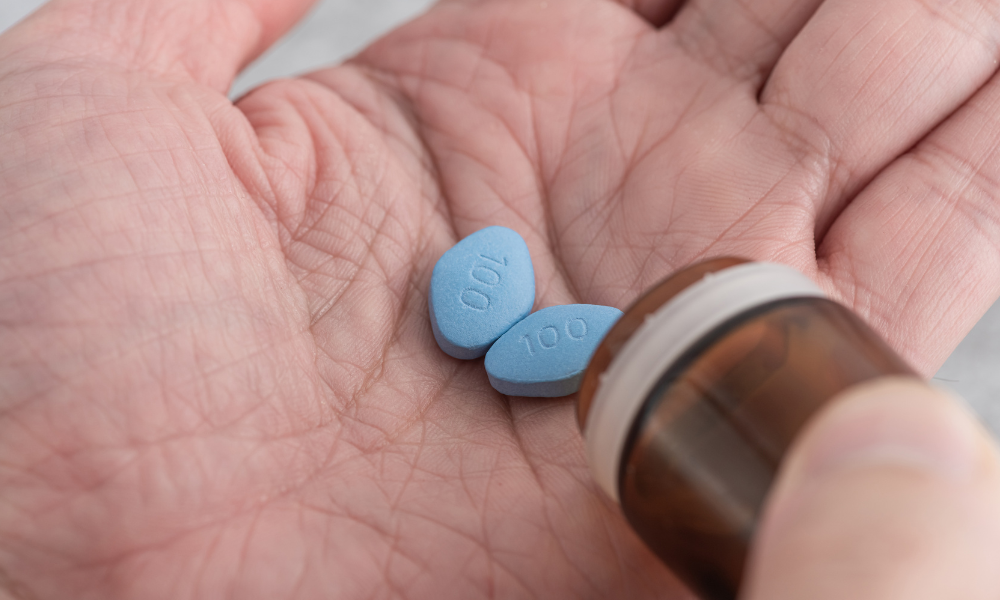Erectile dysfunction (ED) is a common condition that many men over 50 suffer from. It can be a source of frustration and shame, but it is important to remember that you are not the only one. Research has shown that around 52% of men between 40 and 70 years of age suffer from erectile dysfunction. To deal with erectile dysfunction, you must understand the causes, examine psychological factors, change your lifestyle, consider medical treatments and examine natural resources and supplements. Let us go deeper into each of these areas to help you get your sexual health under control.
Understand erectile dysfunction
An erectile dysfunction, also called impotence, is the inability to get or retain an erection that is sturdy enough for sexual intercourse. Although incidental problems with erections are normal, persistent problems may indicate a greater problem. To understand the science behind erectile dysfunction, it is important to investigate the causes.
An erectile dysfunction is a complex condition in which a combination of physical and psychological factors plays a role. The core of the erection process is a complex interplay of neurological, vascular and hormonal factors. When a man gets sexually excited, the brain sends signals to the nerves in the penis, causing blood flow to get going and the penis fills up with blood. Every disruption in this process can lead to erectile dysfunction.
One of the most common causes of erectile dysfunction is chronic diseases such as diabetes, cardiovascular diseases and high blood pressure. These disorders can damage the blood vessels and nerves that are essential for a healthy erection. In addition, obesity can contribute to erectile dysfunction by increasing the risk of developing conditions such as diabetes and cardiovascular disease.
Choices in your lifestyle can have a major influence on the erectile function. The use of tobacco or alcohol can damage the blood vessels and reduce blood flow to the penis, making it difficult to get an erection. Psychological factors, such as stress, anxiety and depression, can also contribute to erectile dysfunction. These factors can disrupt the brain's ability to send signals to the penis, leading to problems getting and retaining an erection.
It is important to know that erectile dysfunction is a common condition that affects men of all ages. It is not something to be ashamed of. Searching for medical help is crucial for diagnosing the underlying causes of ED and finding the right treatment options. With the right approach, many men can overcome this condition and regain their sexual self -confidence.
Incontinence and erectile dysfunction
11% to 34% of the older men report urine incontinence, but we know that the condition is far too little reported. The prevalence is even higher for men who have surgery on prostate cancer. 9 out of 10 men who have undergone prostate cancer surgery suffer from incontinence after surgery. Incontinence and ED have many the same risk factors, such as aging, diabetes, obesity or certain medical treatments. In addition, the psychological effects of incontinence can lead to problems with self -esteem that contribute to erectile dysfunction. Although these disorders are not directly related to each other, they are often intertwined in one way or another.
Psychological factors in erectile dysfunction
Although the physical causes of erectile dysfunction are often the primary focus, it is important not to overlook the psychological factors that can contribute to the condition. For example, fear and depression can affect sexual desire and sexual performance.
Fear and erectile dysfunction
Anxiety, whether it has to do with performance or other personal problems, can disrupt the brain's ability to control the necessary signals for an erection. This can cause a cycle of fear and problems with erections, which leads to further frustration and fear.
In addition to performance anxiety, there are other types of fear that can contribute to erectile dysfunction. For example, generalized anxiety disorder is characterized by excessive care and fear of various aspects of life. This constant state of fear can make it difficult for people to relax and enjoy sexual experiences, which leads to problems with getting and retaining an erection.
Moreover, the social anxiety disorder, where there is an intense fear of social situations, can also affect sexual functioning. People with this disorder can feel extremely self -conscious during sexual encounters, making it a challenge to fully commit and experience sexual pleasure.
Depression and influence on the erectile function
Depression can also have a significant influence on the sexual function. The feelings of sadness and a low self -esteem that are accompanied by depression can dampen sexual desire and the ability of the brain to initiate the erection process.
Moreover, depression often leads to a decrease in the overall energy level, which can further contribute to erectile dysfunction. Fatigue and lack of motivation can make it difficult for people to undertake sexual activities and retain an erection.
It is important to know that the relationship between depression and erectile dysfunction works in two directions. Although depression can contribute to erectile dysfunction, the frustration and the feeling of self -esteem that arise from the experience of ED can also aggravate the symptoms of depression.
In addition, the drugs that are often prescribed for depression, such as selective serotonin re -admission inhibitors (SSRIs), may have sexual side effects that further aggravate erectile dysfunction. These drugs can lower and interfere with the libido with the physiological processes involved in getting and retaining an erection.
In general, understanding the psychological factors that contribute to erectile dysfunction is crucial for developing extensive treatment plans. Tackling fear and depression through therapy, adjusting medication and changing lifestyle can considerably improve sexual function and overall well -being.
Lifestyle and Ed
Adopting a healthy lifestyle can play a crucial role in dealing with erectile dysfunction. Making changes to your diet, exercise and avoiding harmful habits such as smoking and excessive alcohol consumption can have a positive influence on your sexual health.
As far as nutrition is concerned, it is not just about eating healthy food, but also about recording specific nutrients that can support erectile dysfunction. Foods rich in zinc, such as oysters, beef and pumpkin seeds, can, for example, help to increase testosterone level, which is important for sexual desires and performance. In addition, consuming foods with many omega-3 fatty acids, such as salmon and walnuts, can improve blood flow and reduce inflammation, both essential for a healthy erection.
The role of food and exercise
A healthy diet and regular exercise can improve overall cardiovascular health, which is essential for maintaining the erectile function. Aerobic exercises, such as jogging, dancing, swimming or cycling, can strengthen your heart and improve blood circulation throughout your body, also to the penis. This increased blood flow can improve your ability to get and maintain an erection.
Exercise also has a direct influence on the testosterone level. Doing strength training, such as weightlifting or resistance training, can stimulate testosterone production, which can improve sexual function and libido. Furthermore, exercise can help to reduce stress and anxiety and improve self -confidence, which are common psychological factors that can contribute to erectile dysfunction.
Alcohol, smoking and erectile dysfunction
Excessive alcohol consumption and smoking can both contribute to erectile dysfunction. Alcohol works depressed on the nervous system, which means that the brain is less able to get an erection. In addition, alcohol can disrupt hormone production and lower the testosterone level, leading to sexual problems.
Smoking, on the other hand, damages blood vessels and limits blood flow, making it more difficult to get and maintain an erection. The chemicals in cigarettes can narrow the blood vessels, so that less blood can flow to the penis. Over time, this can lead to atherosclerosis, a condition in which Plaque accumulates in the arteries, which increases blood flow and the risk of erectile dysfunction increases.
Stopping smoking and drinking less alcohol can considerably improve erectile dysfunction. Studies have shown that men who quit smoking experience improvements in their ability to get and retain erections. In the same way, reducing or completely stopping alcohol can have a positive influence on overall sexual health. For example, both smoking and alcohol have been shown to aggravate the symptoms of urinary incontinence.
In short, taking a healthy lifestyle with a balanced diet, regular exercise and avoiding harmful habits such as smoking and excessive alcohol consumption can significantly improve the erectile function. By taking good care of your overall health, you can improve your sexual well -being and enjoy a satisfactory sex life.
Medical treatments for erectile dysfunction
If changes in lifestyle are not sufficient to control erectile dysfunction, there are various medical treatment options available. These include prescribed medicines and surgical procedures.
Prescription medicines and their effects
Oral medicines such as Viagra, Cialis and Levitra are often used to treat erectile dysfunction. These drugs increase blood flow to the penis, making it easier to get and maintain an erection. It is important to consult with a healthcare professional before you use these medicines, because they can have an interaction with other medicines or have possible side effects.
Surgical interventions for erectile dysfunction
In some cases, surgical procedures may be needed to treat erectile dysfunction. Procedures such as penis implants or vascular surgery can restore the erectile function in people who do not respond to other treatment options. These procedures are usually considered when all other options have been investigated.
















